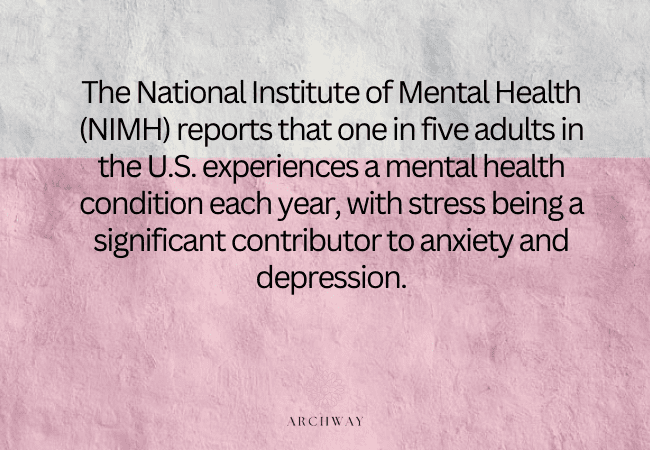In today’s fast-paced world, stress is almost unavoidable. Whether it’s work pressures, family responsibilities, or personal challenges, stress can quickly accumulate, impacting your mental health. However, learning how to manage and reduce stress effectively is key to maintaining a balanced, healthy life. At Archway Behavioral Health, we are dedicated to helping individuals not only manage stress but also thrive in their mental health recovery journey. Through a combination of therapeutic techniques and structured support, we guide our clients in developing sustainable ways to manage stress and nurture emotional well-being.
In this blog, we’ll explore effective stress-reduction strategies, the role of therapy in managing stress, and how Mental Health Treatment Programs like Partial Hospitalization Programs (PHP) and Intensive Outpatient Programs (IOP) at Archway Behavioral Health can support individuals on their path to healing.
1. Mindfulness and Meditation: Cultivating Calm
Mindfulness and meditation are two powerful tools for stress reduction. These techniques focus on staying present in the moment and fostering awareness of your thoughts, emotions, and physical sensations. Practicing mindfulness can help you detach from the overwhelming pressure of daily stressors and bring your focus back to the present, which is essential for reducing anxiety and stress.
Why It Works:
- Mindfulness helps lower cortisol levels, which are associated with stress, and boosts positive emotions by increasing serotonin production.
- Regular meditation can help you develop a greater sense of emotional balance and clarity, even in difficult situations.
How We Help: At Archway Behavioral Health, mindfulness and meditation are integrated into several therapeutic approaches, including DBT Therapy in Florida (Dialectical Behavior Therapy) and CBT Therapy in Florida (Cognitive Behavioral Therapy). These therapies incorporate mindfulness practices to help clients stay grounded and manage their emotions effectively, reducing stress and promoting emotional well-being.
2. Exercise: Boosting Your Mood and Reducing Stress
Exercise is not only good for your body but also a powerful stress buster. When you exercise, your body releases endorphins, which are natural mood boosters. Physical activity also reduces levels of stress hormones, like cortisol, which can be elevated during periods of anxiety.
Why It Works:
- Regular physical activity helps regulate sleep, boosts self-esteem, and improves mood.
- It provides a natural outlet for pent-up energy, which can otherwise exacerbate stress.
How We Help: At Archway Behavioral Health, we incorporate exercise into our Partial Hospitalization Programs (PHP) and Intensive Outpatient Programs (IOP) as part of a holistic approach to treatment. Physical wellness plays a crucial role in mental health recovery. In addition to structured therapy sessions, we encourage clients to engage in exercise routines that are designed to promote overall well-being.
3. Therapy: Professional Support to Manage Stress
Whether you’re dealing with chronic stress or experiencing overwhelming emotions, therapy can provide valuable support. Individual therapy helps you explore the root causes of stress and develop coping mechanisms to address those stressors. Group therapy offers the added benefit of community support, allowing individuals to share experiences and learn from each other’s struggles.
Why It Works:
- Therapy offers a safe, non-judgmental space to express emotions and discuss difficult topics, which can reduce feelings of isolation and helplessness.
- Therapies like DBT Therapy and CBT Therapy teach practical skills for managing thoughts, emotions, and behaviors in healthier ways.
How We Help: At Archway Behavioral Health, we offer Individual Therapy and Group Therapy as essential components of our Mental Health Treatment Programs. These therapies provide clients with the tools they need to manage stress, process difficult emotions, and develop healthier coping strategies. Both DBT and CBT are designed to help clients reframe negative thought patterns and replace them with more constructive ways of thinking.
4. Sleep: The Power of Restful Nights
Chronic stress often disrupts sleep patterns, which, in turn, can exacerbate stress. Adequate sleep is crucial for emotional regulation and cognitive functioning, and it directly impacts your ability to cope with daily stressors. Prioritizing sleep hygiene is essential for reducing anxiety, boosting mood, and improving overall mental health.
Why It Works:
- Sleep improves brain function, helping you process emotions and stress more effectively.
- It also allows your body to heal and restore energy, ensuring you’re better equipped to handle the challenges of the next day.
How We Help: At Archway Behavioral Health, we emphasize the importance of healthy sleep habits as part of our treatment approach. We educate clients on sleep hygiene strategies, such as maintaining a regular sleep schedule, creating a relaxing bedtime routine, and addressing factors like diet and screen time that can interfere with quality sleep.
5. Building Supportive Relationships: Social Connection for Stress Relief
Strong, supportive relationships are critical for mental well-being. When you have a network of people who understand and care about your emotional needs, it can significantly reduce the burden of stress. Whether through family, friends, or professional support, social connection provides a sense of belonging and security, which helps you feel more resilient in the face of stress.
Why It Works:
- Positive relationships provide emotional support, encouragement, and practical assistance during stressful times.
- Socializing with others also allows you to share your experiences and gain new perspectives on managing stress.
How We Help: At Archway Behavioral Health, we incorporate social connection into our Group Therapy sessions, where clients can share their experiences and offer support to others. Being part of a community can foster a sense of belonging, making it easier to handle stress and adversity.
6. Creative Expression: Relieving Stress through Art and Creativity
Creative activities like painting, writing, and music provide therapeutic outlets for emotions. Engaging in creative expression can reduce stress, improve mood, and enhance emotional well-being. Whether you are creating art or simply appreciating it, these activities help you process and release pent-up feelings in a safe, productive manner.
Why It Works:
- Creative expression offers a healthy way to release emotions that may otherwise be difficult to verbalize.
- It provides an opportunity for self-reflection, which can lead to greater emotional insight and growth.
How We Help: As part of our Mental Health Treatment Programs, Archway Behavioral Health often integrates creative therapy options like art and music therapy. These activities encourage clients to explore their emotions and foster a sense of accomplishment and empowerment, which can reduce stress and improve overall well-being.
7. Relaxation Techniques: Deep Breathing and Progressive Muscle Relaxation
Relaxation techniques like deep breathing exercises and progressive muscle relaxation can provide immediate relief from stress. These practices help lower heart rate, reduce muscle tension, and activate the body’s natural relaxation response, creating a state of calmness and relaxation.
Why It Works:
- Relaxation techniques are simple to use and can be implemented anywhere to reduce acute stress.
- They help calm the body’s physical response to stress and create a sense of peace and relaxation.
How We Help: At Archway Behavioral Health, we teach clients how to incorporate relaxation techniques into their daily routine, both in and out of therapy. Techniques like deep breathing and progressive muscle relaxation are taught in DBT and CBT Therapy, helping individuals cope with stress and anxiety more effectively.
Conclusion
Managing stress effectively is essential for maintaining mental health and achieving long-term recovery. At Archway Behavioral Health, we provide personalized care to help individuals manage stress, improve mental health, and lead fulfilling lives. Through a combination of therapy, social support, physical activity, and relaxation techniques, our clients learn how to reduce stress and thrive.
If you or someone you love is struggling with stress or mental health challenges, our team at Archway Behavioral Health is here to help. Our Partial Hospitalization Program (PHP) and Intensive Outpatient Program (IOP) in Florida offer comprehensive treatment options that address both the mind and body, providing you with the tools to manage stress and improve your overall well-being. Take the step toward reclaiming your life and health—contact us at (888) 488-4103



